Are the national teachers unions really ready to make a comeback against the neoliberal attacks on public education and unions?
[Editor's Note. The article below comes out as "Can the teachers' unions come back?" on July 10, 2014 at Socialist Worker -- http://socialistworker.org/2014/07/10/can-teachers-unions-rebound -- as Chicago's delegates head to Los Angeles for the convention of the American Federation of Teachers. Reprinted with permission of the reporter. Graphics with this article provided by substancenews.net. George N. Schmidt, Editor, Substance].
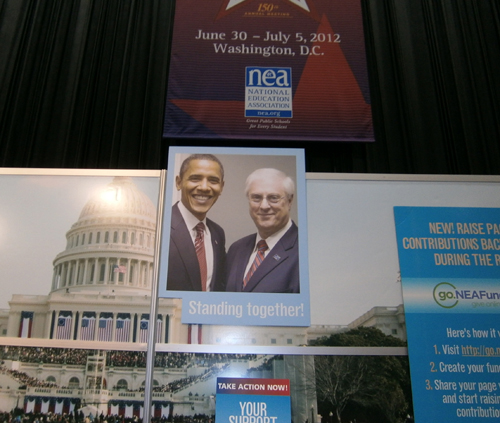 Despite the fact that Barack Obama had deliberately refused to appear at either of the national teacher union conventions in 2008 or 2012, lying to the AFT in 2008 about his schedule, the unions slavishly backed him and allowed their members to be wowed by Vice President Joe Biden's speech about how Biden's wife Jill was a union teacher, even as Obama was pushing union busting neo-liberal programs that surpassed the attacks on public education that had been a signature of the administration of George W. Bush. Substance photo from the 2012 NEA convention by Rich Gibson.ANALYSIS: LEE SUSTAR... Lee Sustar asks whether teachers' unions will look to the 2012 strike in Chicago as a model for moving ahead--or continue their retreat in the name of "partnership.", July 10, 2014
Despite the fact that Barack Obama had deliberately refused to appear at either of the national teacher union conventions in 2008 or 2012, lying to the AFT in 2008 about his schedule, the unions slavishly backed him and allowed their members to be wowed by Vice President Joe Biden's speech about how Biden's wife Jill was a union teacher, even as Obama was pushing union busting neo-liberal programs that surpassed the attacks on public education that had been a signature of the administration of George W. Bush. Substance photo from the 2012 NEA convention by Rich Gibson.ANALYSIS: LEE SUSTAR... Lee Sustar asks whether teachers' unions will look to the 2012 strike in Chicago as a model for moving ahead--or continue their retreat in the name of "partnership.", July 10, 2014
Are the leaders of the national teachers unions finally learning the lessons of the Chicago Teachers Union (CTU) strike of 2012?
Nearly two years afterward, the CTU strike remains the outstanding example of resistance to the corporate school reform agenda that aims to turn public education into a marketplace and render teachers' unions powerless.
In the wake of the strike, it was inevitable that the leaders of the American Federation of Teachers (AFT) and National Education Association (NEA) would take a more combative tone at their union conventions this month, speaking more frankly than ever before about the relentless attacks on teacher organizations.
But the question remains as to whether top union officials at the American Federation of Teachers (AFT) and National Education Association (NEA) will break from a failed--and increasingly disastrous--strategy of making concessions to preserve partnership with increasingly anti-union politicians and school officials.
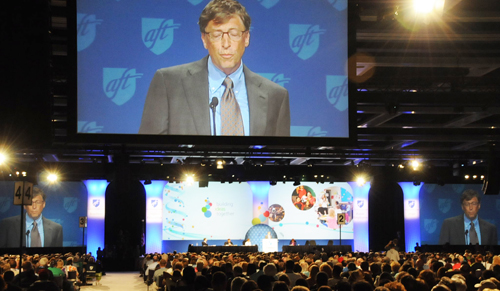 Some delegates walked out of the 2010 AFT convention in Seattle when Randi Weingarten introduced the keynote speaker, billionaire and union buster Bill Gates. Most of the delegates, however, followed Randi's demand that the convention's 3,000 people give Gates an "AFT Welcome" and following the billionaire's speech, many of the delegates, led by the Baltimore union local, rose to give Gates a standing ovation. Weingarten herself personally pushed the Baltimore local (among others) into accepting a contract that included "merit pay" based on test scores and the absurd "value added" test-score-based versions of reality promoted by Gates. AFT locals in Tampa, Pittsburgh, Memphis and Denver accepted millions of dollars from Gates to push the plans. Substance photo by George N. Schmidt.At the July 1-6 convention of the NEA's Representative Assembly, delegates took a left turn, passing a resolution calling for the resignation of Education Secretary Arne Duncan. Newly elected NEA President Lily Eskelsen GarcÌa spoke to the delegates' mood when she said in an interview with Politico [1] that value-added measures of test scores are "the mark of the devil." She also said the union would distance itself from the Democratic Party, which has been leading the education reform crusade during Barack Obama's presidency.
Some delegates walked out of the 2010 AFT convention in Seattle when Randi Weingarten introduced the keynote speaker, billionaire and union buster Bill Gates. Most of the delegates, however, followed Randi's demand that the convention's 3,000 people give Gates an "AFT Welcome" and following the billionaire's speech, many of the delegates, led by the Baltimore union local, rose to give Gates a standing ovation. Weingarten herself personally pushed the Baltimore local (among others) into accepting a contract that included "merit pay" based on test scores and the absurd "value added" test-score-based versions of reality promoted by Gates. AFT locals in Tampa, Pittsburgh, Memphis and Denver accepted millions of dollars from Gates to push the plans. Substance photo by George N. Schmidt.At the July 1-6 convention of the NEA's Representative Assembly, delegates took a left turn, passing a resolution calling for the resignation of Education Secretary Arne Duncan. Newly elected NEA President Lily Eskelsen GarcÌa spoke to the delegates' mood when she said in an interview with Politico [1] that value-added measures of test scores are "the mark of the devil." She also said the union would distance itself from the Democratic Party, which has been leading the education reform crusade during Barack Obama's presidency.
Then again, the NEA's problems are impossible for the new president to ignore. The country's largest labor union is facing up to a stunning loss of 230,000 members over the past few years [2].
 Delegates to the 2012 NEA Representative Assembly signed a massive wall scroll to Barack Obama, ignoring the fact that the President of the United States had carried out a neoliberal education reform program -- Race To The Top -- that was more vicious in its attacks on public school teachers than the "No Child Left Behind" program of Obama's predecessor, George W. Bush. Substance photo by Rich Gibson.In 2012, the NEA launched a new organizing center to increase membership and branch out into the rest of the public sector. "We could not do business as we had in the past," John Vellardita, executive director of the 11,000-member Clark County Education Association in Las Vegas. "Overnight, we had to get into the field, because we were irrelevant. People didn't know who we were or what we stood for. We hadn't been in the buildings in years."
Delegates to the 2012 NEA Representative Assembly signed a massive wall scroll to Barack Obama, ignoring the fact that the President of the United States had carried out a neoliberal education reform program -- Race To The Top -- that was more vicious in its attacks on public school teachers than the "No Child Left Behind" program of Obama's predecessor, George W. Bush. Substance photo by Rich Gibson.In 2012, the NEA launched a new organizing center to increase membership and branch out into the rest of the public sector. "We could not do business as we had in the past," John Vellardita, executive director of the 11,000-member Clark County Education Association in Las Vegas. "Overnight, we had to get into the field, because we were irrelevant. People didn't know who we were or what we stood for. We hadn't been in the buildings in years."
THE MEMBERSHIP decline could get even worse if anti-union forces have their way. The NEA convention opened just a few weeks after a California judge ruled that teacher tenure was unconstitutional under that state's law [3]. As result, the NEA's biggest state affiliate--the 325,000-member California Teachers Association--is under enormous pressure.
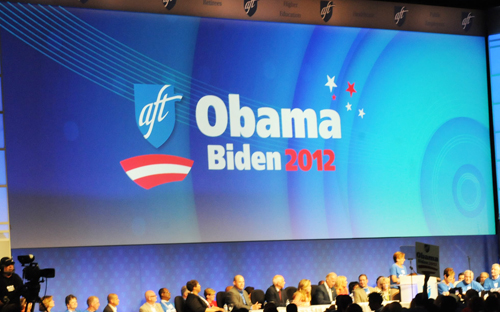 By the time the American Federation of Teachers got to Detroit for its 2012 convention, the policies of the Obama administration, via charter expansion and Race to the Top, had effectively destroyed Detroit's real public schools and replaced many of them with charter schools. Nevertheless, AFT President Randi Weingarten (barely visible at the podium in the above photograph) feted Joe and Jill Biden and Biden's blarney. When Randi called for the AFT Executive Council members to come up on stage to sit with Obama's Vice President, only one, Chicago's Karen Lewis, did not go up or wear the "Obama Biden" tee shirt. Instead, most CTU delegates held up signs opposing Race To The Top. Substance photo by Kati Gilson.While the ruling will be appealed, it will give further momentum to attacks on teacher tenure, an issue where the AFT in particular has been retreating for several years [4], as contracts in New Haven, Conn., St. Louis, Baltimore and other cities show.
By the time the American Federation of Teachers got to Detroit for its 2012 convention, the policies of the Obama administration, via charter expansion and Race to the Top, had effectively destroyed Detroit's real public schools and replaced many of them with charter schools. Nevertheless, AFT President Randi Weingarten (barely visible at the podium in the above photograph) feted Joe and Jill Biden and Biden's blarney. When Randi called for the AFT Executive Council members to come up on stage to sit with Obama's Vice President, only one, Chicago's Karen Lewis, did not go up or wear the "Obama Biden" tee shirt. Instead, most CTU delegates held up signs opposing Race To The Top. Substance photo by Kati Gilson.While the ruling will be appealed, it will give further momentum to attacks on teacher tenure, an issue where the AFT in particular has been retreating for several years [4], as contracts in New Haven, Conn., St. Louis, Baltimore and other cities show.
The assault on tenure poses the risk of even greater losses for the NEA. Even with its decline, the NEA is still the biggest union in the U.S--with a stated membership of 3 million, it is far bigger than its smaller rival, the AFT, which claims 1.5 million. (The size of the actual membership of the unions is hard to pin down, however, as dual affiliations by state teachers' unions in Florida, New York and elsewhere allows each union to count the same people as members.)
Government cutbacks account for a big chunk of the membership losses. But that isn't some inevitable byproduct of the Great Recession. It's a conscious policy, with school districts turning tight budgets into an opportunity to cut unions down to size, ramp up class sizes, and funnel taxpayer money into nonunion charter schools.
 The CORE leadership of the Chicago Teachers Union did not limit itself to activism around education issues. In May 2012, CORE carried a banner during the massive protests against the NATO summit in Chicago. Above, Kim Bowky (now Kim Goldbaum) holds the CORE banner during the massive May 21, 2012 march against NATO and the war in Afghanistan. Substance photo by Sarah Chambers.In Chicago, where Mayor Rahm Emanuel never misses an opportunity to try to take revenge for the CTU's strike success, the mayoral-appointed school board has used budgetary concerns as the dubious reason to close 50 schools in 2013; lay off 3,000 school employees, including 2,000 teachers in the aftermath--and more recently shed another 1,000 teachers.
The CORE leadership of the Chicago Teachers Union did not limit itself to activism around education issues. In May 2012, CORE carried a banner during the massive protests against the NATO summit in Chicago. Above, Kim Bowky (now Kim Goldbaum) holds the CORE banner during the massive May 21, 2012 march against NATO and the war in Afghanistan. Substance photo by Sarah Chambers.In Chicago, where Mayor Rahm Emanuel never misses an opportunity to try to take revenge for the CTU's strike success, the mayoral-appointed school board has used budgetary concerns as the dubious reason to close 50 schools in 2013; lay off 3,000 school employees, including 2,000 teachers in the aftermath--and more recently shed another 1,000 teachers.
The impact of the economic crisis has been supercharged by Obama's Race to the Top program, which pressured states to compete for additional federal education funding by passing legislation that targets teachers with punitive evaluation systems tied to student test scores--and opens the way for nonunion charter schools.
As a result of Race to the Top, suburban and small-town NEA locals--which had been relatively insulated from the education reform agenda initially focused on urban districts more likely to be represented by the AFT--are now themselves getting hammered. What's more, the new evaluation systems are coming on stream just at the Common Core curriculum--a quasi-national program pushed through in 45 states and the District of Columbia by business-backed nonprofit groups--has thrown K-12 education into turmoil in many parts of the U.S.
AS A result of all this, the NEA is now seeing the kind of debate that the CTU has brought to the AFT--over the need for confrontation, not cooperation, with the forces of education reform.
That's how Barbara Madeloni won her long-shot campaign for the presidency of the Massachusetts Teachers Association (MTA) earlier this year. Madeloni, who was fired from the University of Massachusetts-Amherst for refusing to administer a corporate-sponsored test in a teacher-training program, won election by speaking bluntly about the need to defend our schools.
"This is a critical moment in our history, and we have to protect public education, or we're going to lose it," Madeloni said following her victory in May [5]. "There's an incredible sea change that's coming from the rank and file in teachers' unions, not just in Massachusetts, but across the country."
Madeloni's victory was followed in short order by the election of longtime union militant Alex Caputo-Pearl as president of United Teachers Los Angeles (UTLA), the second-biggest teachers union local in the U.S. With two-thirds of UTLA members in the NEA and the rest in the AFT, the impact of the UTLA election will reverberate through both unions.
As part of the Union Power slate, Caputo-Pearl campaigned on the need to follow the CTU example to rebuild union organization at the schools, reach out to parent and community groups, and prepare for a possible strike to reverse the pattern of concession bargaining.
The developments in the MTA and UTLA can open the way for a long overdue debate in the NEA, which is dominated by full-time career staffers who serve as executive directors and statewide officials for many years at a stretch, while elected leaders of the often-small NEA locals come and go due to term limits.
The shifting mood in the union was likely on President Eskelsen GarcÌa's mind when she made her acceptance speech. After denouncing standardized testing as a "corrupting" of teaching and learning, she told delegates [6], "We know what is at stake, and it is why we are who we are. It is why we are fearless and why we will not be silent when people who for their own profit and political posture subvert words like 'reform' or 'accountability.'"
Nevertheless, Eskelsen GarcÌa's has made it clear that she is not willing to break with the business-driven education reformers. In her interview with Politico, she said that the Gates Foundation--which has bankrolled aggressive corporate education reform for more than a decade--could nevertheless be a partner with teachers' unions in raising education standards.
"They funded the Common Core," Eskelsen GarcÌa said. "And for some of our folks, it's like, 'But the Gates Foundation funded the Common Core, so we must be suspect. It's corporate. It's Bill Gates--the mega billionaire!' But I don't see it that way. I see the Gates Foundation as funding ideas."
IF THERE'S a big gap between rhetoric and policy in the NEA leadership, it's a chasm when it comes to the AFT and its president, Randi Weingarten.
Back in October, the AFT released a document, "The Principles that Unite Us" [7]--probably one of the most progressive documents the union has published in decades.
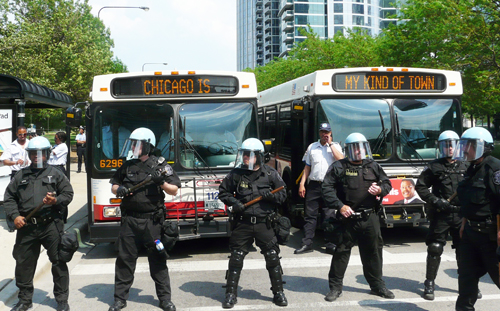 While the policies of the Obama administration continue to drain resources from public services in the United States, generous support has been given to the creation of the police state that was on display when tens of thousands of citizens assembled in Chicago to protest the NATO summit in May 2012. Chicago Mayor Rahm Emanuel has proudly deployed police in expensive riot great along all of the march routes, while police intimidation of protests included restricting a large group of Iraq and Afghanistan war veterans, who are now organized against the wars, to get near the NATO people. Substance photo by Sarah Chambers.The influence of the CTU--which has released a series of sharp statements and well-researched analyses over the past few years--is clear. The Principles document slams school closures and their racial impact, opposes privatization of public education and defends teachers' unions as a voice for both educators and kids The statement further decries continued racial segregation in schools, opposes zero-tolerance discipline because of its effect on African American and Latino kids, and denounces high-stakes testing.
While the policies of the Obama administration continue to drain resources from public services in the United States, generous support has been given to the creation of the police state that was on display when tens of thousands of citizens assembled in Chicago to protest the NATO summit in May 2012. Chicago Mayor Rahm Emanuel has proudly deployed police in expensive riot great along all of the march routes, while police intimidation of protests included restricting a large group of Iraq and Afghanistan war veterans, who are now organized against the wars, to get near the NATO people. Substance photo by Sarah Chambers.The influence of the CTU--which has released a series of sharp statements and well-researched analyses over the past few years--is clear. The Principles document slams school closures and their racial impact, opposes privatization of public education and defends teachers' unions as a voice for both educators and kids The statement further decries continued racial segregation in schools, opposes zero-tolerance discipline because of its effect on African American and Latino kids, and denounces high-stakes testing.
The AFT document situates the battle for public education in the context of rising social inequality:
The divide between rich and poor in the United States is vast and growing. Millions of children grow up in oppressive poverty while the super-rich advocate for policies that increase their wealth at others' expense. For the past 20 years, we have watched as corporate interests attempt to dismantle public education and create a new, market-based system of schooling.
Nevertheless, "The Principles that Unite Us" doesn't mark a complete departure from the AFT's partnership strategy.
In the view of its authors and signatories, charter schools are not inherently bad--just the ones run by private operators. They think one of the problems with corporate education reform is that it interferes with collaboration between teachers and schools--skating over the fact that the inevitable conflict between educators and school officials gave rise to teacher unionism decades before corporate reformers came on to the scene.
But the biggest problem with the AFT's document is what it doesn't say. There's no mention of the Obama administration, Race to the Top, or Arne Duncan.
That way, the AFT can avoid having to call out the Democratic Party and its role in pushing the corporate education agenda that the union has critiqued. The document is also silent on merit pay--the abandonment of the union principle of equal pay for equal work--because the AFT encourages it.
Moreover, the word "tenure"--teachers' right to due process against threats to their job--never appears in the document. That's no surprise, because Weingarten has been personally involved in several local union negotiations that dismantled tenure [8].
In fact, when Duncan praised the tenure-trashing Vergara court decision on tenure in California, AFT President Weingarten wrote to him calling for better "leadership" on the issue. Diane Ravitch, a former education official in the first Bush administration, used her blog to correct Weingarten [9]: "But Arne Duncan showed that he IS a leader: a leader in the effort to strip teachers of due process and a leader in the well-funded campaign to erode public confidence in public schools."
 Beginning at ten a.m. on the first day of the Chicago Teachers Strike of 2012, mass marches either went through Chicago's downtown (the "Loop") or through the city's neighborhoods. The only day without mass actions was the Sunday that ended the strike's first week. Above, a march through the city's West Side, most of it an African American community, was held on Saturday September 15, 2012. Throughout the line of march the strikers and their supporters were greeted with great enthusiasm by community residents, especially the children. Substance photo by Kati Gilson.Thus, when the AFT delegates meet in Los Angeles, they'll be asked to suspend disbelief. On the one hand, they'll likely hear a keynote speech from Weingarten that sounds the themes of the Principles document, while being asked to accept policies that continue to put partnership above all else--even at the cost of more concessions.
Beginning at ten a.m. on the first day of the Chicago Teachers Strike of 2012, mass marches either went through Chicago's downtown (the "Loop") or through the city's neighborhoods. The only day without mass actions was the Sunday that ended the strike's first week. Above, a march through the city's West Side, most of it an African American community, was held on Saturday September 15, 2012. Throughout the line of march the strikers and their supporters were greeted with great enthusiasm by community residents, especially the children. Substance photo by Kati Gilson.Thus, when the AFT delegates meet in Los Angeles, they'll be asked to suspend disbelief. On the one hand, they'll likely hear a keynote speech from Weingarten that sounds the themes of the Principles document, while being asked to accept policies that continue to put partnership above all else--even at the cost of more concessions.
As Dana Blanchard, a member of the Berkeley Federation of Teachers in California and a delegate to the AFT convention, put it:
"The Principles that Unite Us" is a great piece of writing and has helped us in our local shape our Quality Education Agenda work, but it has not translated into real fights on the ground and does not seem to have influenced the way AFT nationally is fighting corporate education reform.
Another delegate to the AFT convention, Kimberly Bowsky Goldbaum, made a similar point. "Over the last year, I've noticed a slight shift in how the national leadership tries to tackle substantive issues publicly," said Goldbaum, a member of the CTU executive board and the union's Black Caucus. "The shift has been produced because of the rise in activism within caucuses and locals across the country as we have had to live with the poor decisions of the politicians."
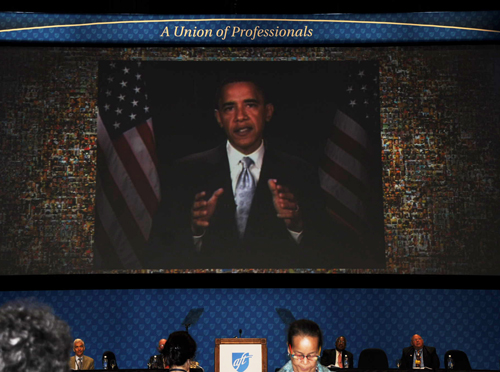 Barack Obama's cynical lies to the nation's unionized teachers didn't begin with his inauguration in January 2009. In July 2008, Obama lied to the leaders of the American Federation of Teachers, claiming that he wasn't able to be in Chicago to meet with the teachers personally during the 2008 AFT convention, which was held at Chicago's Navy Pier. Actually, Obama was observed on the second day of the convention secretly doing a fundraiser for rich people ($2,000 to $5,000 per person for an autographed photo with Obama) at Chicago's Regency Hyatt Hotel where many of the convention delegates were staying. When Substance reported Obama's lie, at first the AFT press office tried to deny that then President Ed McElroy knew about the affront, but later Substance learned from a very reliable source that MeElroy had become very angry in a conversation with the man who would the following month win the presidential nomination of the Democratic Party. Substance photo from the 2008 AFT convention above shows Obama skyped in from San Diego to talk to the teachers convention. Obama also rewrote his own political history by the summer of 2008, feeding The New York Times a front page story about his Chicago roots which deliberately ignored that fact that it was the strong support from the leaders of the Chicago Teachers Union years earlier that had put Obama in the United States Senate. The key to shifting the direction of the teachers' unions is the activism of rank-and-file teachers, she added. "The work of active membership to fight for workers' and students' rights--regardless of the national's direction--helps strengthen unionism."
Barack Obama's cynical lies to the nation's unionized teachers didn't begin with his inauguration in January 2009. In July 2008, Obama lied to the leaders of the American Federation of Teachers, claiming that he wasn't able to be in Chicago to meet with the teachers personally during the 2008 AFT convention, which was held at Chicago's Navy Pier. Actually, Obama was observed on the second day of the convention secretly doing a fundraiser for rich people ($2,000 to $5,000 per person for an autographed photo with Obama) at Chicago's Regency Hyatt Hotel where many of the convention delegates were staying. When Substance reported Obama's lie, at first the AFT press office tried to deny that then President Ed McElroy knew about the affront, but later Substance learned from a very reliable source that MeElroy had become very angry in a conversation with the man who would the following month win the presidential nomination of the Democratic Party. Substance photo from the 2008 AFT convention above shows Obama skyped in from San Diego to talk to the teachers convention. Obama also rewrote his own political history by the summer of 2008, feeding The New York Times a front page story about his Chicago roots which deliberately ignored that fact that it was the strong support from the leaders of the Chicago Teachers Union years earlier that had put Obama in the United States Senate. The key to shifting the direction of the teachers' unions is the activism of rank-and-file teachers, she added. "The work of active membership to fight for workers' and students' rights--regardless of the national's direction--helps strengthen unionism."
The AFT has, nevertheless, taken some significant steps forward. Its campaign in higher education has scored some successes recently, winning first contracts for faculty at the University of Oregon and University of Illinois-Chicago. Plus, the union has improved relations with the emerging education justice movement by revamping its human rights and community relations department under veteran organizer Eric Zachary. As one AFT organizer put it, the union now listens to community partners and backs their struggles, instead of just asking for support for its own agenda.
The problem is the AFT is pursuing a kind of social movement unionism--but without the "unionism" part.
The CTU was successful in Chicago because it reached out to community allies even as it worked to rebuild the basic organization of the union. It unapologetically made the connection between teachers' demand for decent compensation and working conditions and the struggle to win more resources to meet the needs of students.
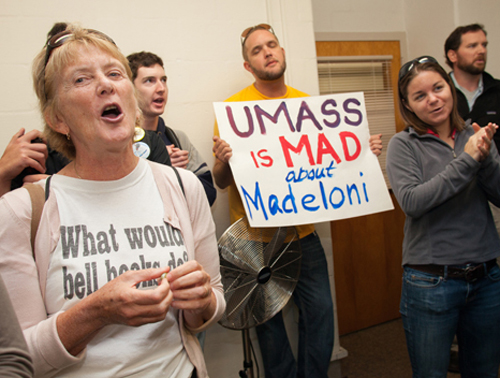 The election of Barbara Madeloni (left) as President of the statewide Massachusetts Teachers Association is another sign of the shifting leadership within the national teachers unions. Madeloni has been telling audiences since her election that the union's first priorities have to be set by the union's members and not by union officials who have for too long answered to "The Statehouse."By contrast, the AFT's version of social movement unionism may forge ties in the community, but if it continues to surrender the union's historic gains like tenure and opposition to merit pay, it will continue to decline. No one will rally to defend a union that isn't willing to defend itself.
The election of Barbara Madeloni (left) as President of the statewide Massachusetts Teachers Association is another sign of the shifting leadership within the national teachers unions. Madeloni has been telling audiences since her election that the union's first priorities have to be set by the union's members and not by union officials who have for too long answered to "The Statehouse."By contrast, the AFT's version of social movement unionism may forge ties in the community, but if it continues to surrender the union's historic gains like tenure and opposition to merit pay, it will continue to decline. No one will rally to defend a union that isn't willing to defend itself.
SOME OF these issues will find their way into floor debate at the convention. The CTU has proposed a resolution opposing Common Core, based on a resolution the Chicago union passed earlier this year. But a more telling discussion may take place at a side meeting--a July 12 panel discussion on social movement unionism sponsored by the CTU and UTLA, which will bring together polar opposites among AFT local leaders.
On the left is CTU President Karen Lewis and UTLA's Alex Caputo-Pearl, who both have long records of organizing alongside community allies as well as experience as tough union activists on the job.
On the right is United Federation of Teachers (UFT) President Michael Mulgrew, who recently presided over passage of a concessionary contract for New York City teachers [10] that spreads out sub-inflation retroactive pay from years without a contract until 2020, brings in merit pay, weakens job security for displaced teachers, opens the way for union-bashing "thin" contracts at 200 schools, and locks in a punitive evaluation system.
It isn't quite clear what Mulgrew--whose local is the power base of the AFT--will have to say about social movement unionism, since he kept the UFT membership in the dark during negotiations, and community mobilization for the contract was precisely zero.
Another panelist will be Mary Cathryn Ricker, president of the St. Paul Federation of Teachers and a major player in the AFT hierarchy. After a recent successful contract campaign with community outreach that was influenced by the CTU, Ricker may have more credibility than Mulgrew in attempting to square the circle between the AFT's bold position papers and its actual policy of retreat.
Whether or not sparks fly at this discussion or on the AFT convention floor, the debate over the direction of teacher unionism will continue. At the center of the discussion is an emerging national network of teacher union militant caucuses [11], a few of which, like Chicago's Caucus of Rank-and-File Educators, hold union office.
While the network is still working to establish itself formally, it is already becoming an important organizing center to take up the issues that the NEA and AFT leaderships are unable or unwilling to deal with. Given the relentless attacks on public education and teachers union, the urgency of building such an opposition couldn't be clearer.
- - - - - - - - - - - - - - - - -
NOTES:
[1] http://dyn.politico.com/printstory.cfm?uuid=E9376FA2-6DFB-4E65-B078-67B0F8913178
[2] http://www.edweek.org/ew/articles/2014/06/04/33organize_ep.h33.html
[3] http://www.nytimes.com/2014/06/11/us/california-teacher-tenure-laws-ruled-unconstitutional.html
[4] http://socialistworker.org/2013/08/21/another-aft-surrender
[5] http://socialistworker.org/2014/07/03/a-critical-moment-for-education
[6] http://neatoday.org/2014/07/06/eskelsen-garcia-we-are-fearless-and-we-will-not-be-silent/
[7] http://www.aft.org/pdfs/about/PrinciplesUniteUs2013.pdf
[8] http://socialistworker.org/2012/07/25/challenges-facing-the-aft
[9] http://dianeravitch.net/2014/06/13/randi-blasts-duncan-for-betraying-teachers-in-vergara-case/
[10] http://socialistworker.org/2014/05/20/we-should-be-voting-no
[11] http://labornotes.org/blogs/2013/08/chicago-teacher-organizing-lessons-go-national
[12] http://creativecommons.org/licenses/by-nc-nd/3.0
[Published by the International Socialist Organization. Material on the Socialist Worker Web site is licensed by SocialistWorker.org, under a Creative Commons (by-nc-nd 3.0) [12] license, except for articles that are republished with permission. Readers are welcome to share and use material belonging to this site for non-commercial purposes, as long as they are attributed to the author and SocialistWorker.org.].

